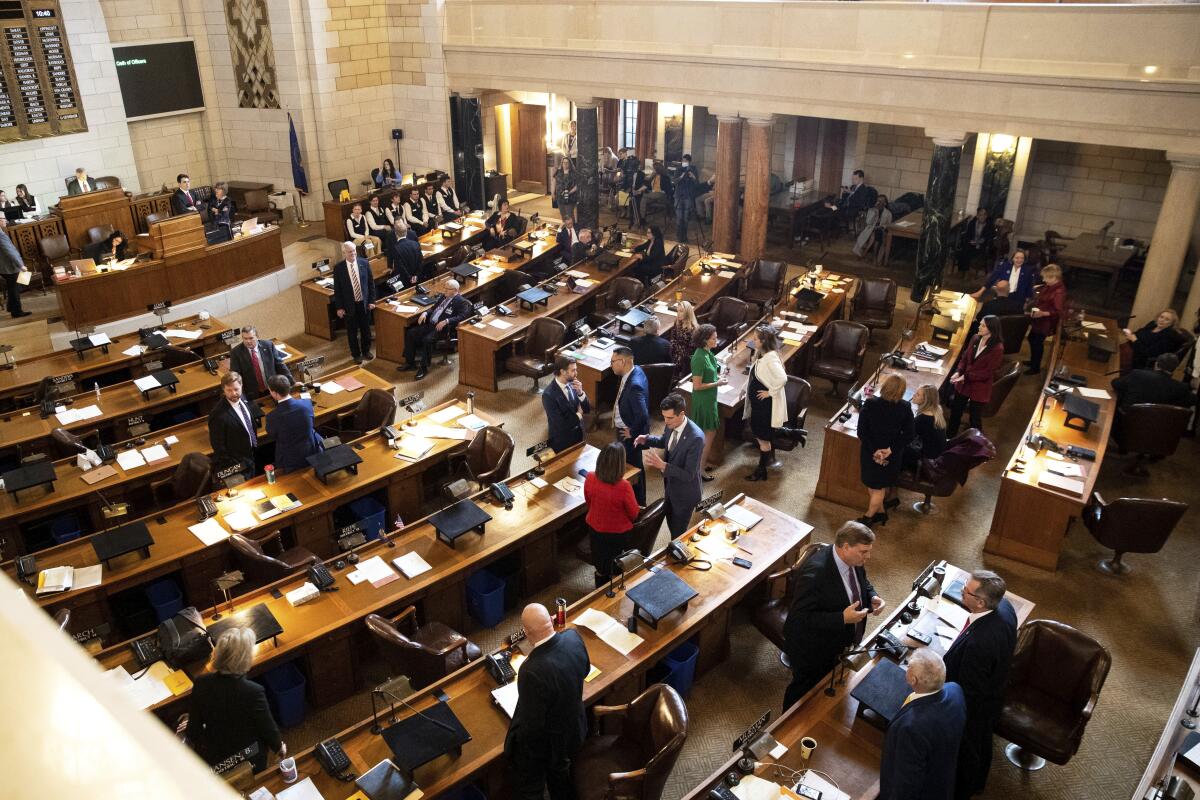Nebraska’s Legislature, officially nonpartisan, reaches a new level of partisan discord

- Share via
LINCOLN, Neb. — The Nebraska Legislature has long prided itself on being a paragon of collegiality and function, as the only single-chamber, officially nonpartisan Legislature in the country.
But after a 2023 session in which the body of 49 lawmakers remained irreconcilably split, Nebraska’s statehouse is beginning to reflect broad, national discord.
The acrimony was on display as a handful of progressive lawmakers carried out a filibuster of nearly every bill that came up for debate — including ones they supported — to protest a bill targeting transgender minors. The filibuster drew national media attention, revealing lawmakers’ divide over political ideology — expressed through yelling, name-calling, crying and the refusal of some to speak to other lawmakers.
“I never saw anything even close to what we witnessed this year,” said Patrick O’Donnell, who served for 45 years as clerk of the Nebraska Legislature until his retirement in December. “This was clearly the worst legislative session we’ve had. It’s just a totally different animal.”
The labor leader and civil rights activist joins calls to remove the statue of the former mayor and governor, the chief champion of Proposition 187 targeting undocumented immigrants.
While officially nonpartisan, all of the Legislature’s members are registered as Republicans, Democrats or independents. Republicans hold a strong majority with 32 seats, but need 33 votes to break a filibuster — a slim margin that has left Republicans unable in recent years to pass signature legislation, such as a near-total abortion ban last year and a bill to allow people to carry concealed guns without a permit.
Frustration over those losses led conservatives to open this session with aggressive moves to exert more control over a state government they’ve dominated for decades. They bucked norms to fill legislative committees, which determine what bills will be debated by the full Legislature, with hard-line conservatives. They did that by removing moderate and progressive lawmakers from key panels and replacing them with more conservative ones, a practice referred to as “cracking and packing.”
Then came the trans health bill by Omaha Sen. Kathleen Kauth, who parroted far-right fears that children are being manipulated, calling the rising number of transgender teens “a social contagion.”
Omaha Sen. Machaela Cavanaugh said she would filibuster every bill if Kauth’s bill advanced, adding she would “burn the session to the ground over this bill.”
Conservatives responded, not only advancing the bill, but amending it to add a 12-week abortion ban, following a nationwide, conservative wave of bills targeting abortion and transgender rights. The hybrid bill passed and was signed into law by Republican Gov. Jim Pillen in late March.
The spectacle that played out over the 90-day session came as a shock to longtime statehouse observers.
Omaha Sen. Megan Hunt, a left-leaning lawmaker who left the Democratic Party mid-session to register as an independent, revealed in a speech on the floor that her 13-year-old child is transgender. She begged fellow lawmakers not to strip her or doctors of the right to care for her child.
Her plea was met with a formal ethics complaint filed by a far-right activist who claimed she had a conflict of interest because her child is transgender. That complaint was dismissed as unfounded Friday.
Frustration saw Hunt and Cavanaugh often lash out at conservative lawmakers — who continued to vote to restrict residents’ access to gender-affirming care — and at measures to strip abortion rights, loosen gun laws, and divert public money to scholarships for private school tuition.
Hunt called other lawmakers “trash” and warned them on the statehouse floor not to speak to her, adding, “I don’t like you.”
Cavanaugh called the body “morally bankrupt” and said she was looking forward to the time “when I no longer have to serve with many of you.”
Some conservative lawmakers lashed back. Sen. Julie Slama called for Cavanaugh’s censure over remarks comparing the trans bill to genocide.
Others used racist and extremist language during debates over restricting abortion. Sen. Steve Erdman bemoaned that since the 1973 legalization of abortion, Nebraska’s population has not grown “except those foreigners who have moved here or refugees who have been placed here … because we’ve killed 200,000 people.”
Sen. Steve Halloran argued that the legalization of abortion in the U.S. had its roots not in choice for women, but in a plot to “kill off the Black race.”
Even moderates and peacemakers were caught in the partisan crossfire. Sen. John Arch, in his first year as speaker of the Legislature, repeatedly called for calm during debate and was heavily criticized by both sides. Progressives accused him of favoring fellow Republicans as he sought to navigate unprecedented challenges. Conservatives thrashed him for refusing to change debate rules mid-session to cut off the filibuster.
The problem is multilayered, O’Donnell said, starting with national partisanship and big-money campaign funding that has seeped into state politics. He also pointed to term limits enacted in 2006 that keep state lawmakers from serving more than eight consecutive years. That doesn’t give lawmakers enough time to learn how to develop long-term agendas or negotiate compromises, he said.
“What we have now is an uninformed and unenlightened Legislature,” O’Donnell said. “Lawmakers used to get to know each other and really talk to each other. That led to floor debate that used to change votes. But I’m afraid that’s gone. What you have now are people who show up knowing how they’re going to vote before they ever even get on the floor. And that’s not legislating.”
A notable exception came when Republican Sen. Merv Riepe, an 80-year-old former hospital administrator, changed his mind on a proposed abortion ban at about six weeks of pregnancy. He had initially cosigned the bill, but after deciding the ban was too severe, he abstained from voting. Without his vote, the bill didn’t have enough votes to advance. He later voted in favor of the 12-week ban that passed.
In response, he received threats from antiabortion supporters who called him “demonic” and “pure evil.” Conversely, many who support abortion rights angrily rebuked him for supporting the 12-week ban.
“Sometimes there’s no way to win in this,” Riepe said when asked about the backlash. “I hope we do better next year and avoid some of the anger and drama we saw this year.”
More to Read
Get the L.A. Times Politics newsletter
Deeply reported insights into legislation, politics and policy from Sacramento, Washington and beyond. In your inbox twice per week.
You may occasionally receive promotional content from the Los Angeles Times.











